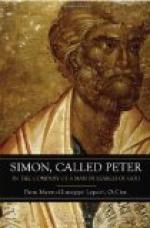Langton laughed. “That’s a little humorous, padre,” he said. “What about the Ten Commandments?”
Peter thought of Julie. He kicked a stone viciously. “Commandments are no use,” he said—“not out here.”
“Nor anywhere,” said Langton, “nor ever, I think, too. Why do you suppose I keep moderately moral? Chiefly because I fear natural consequences and have a wife and kiddies that I love. Why does Jenks do the opposite? Because he’s more of a fool or less of a coward, and chiefly loves himself. That’s all, and that’s all there is in it for most of us.”
“You don’t fear God at all, then?” demanded Peter.
“Oh that I knew where I might find him!” quoted Langton. “I don’t believe He thundered on Sinai, at any rate.”
“Nor spoke in the Sermon on the Mount?”
“Ah, I’m not so sure but it seems to me that He said too much or He said too little there, Graham. One can’t help ‘looking on’ a woman occasionally. And in any case it doesn’t seem to me that the Sermon is anything like the Commandments. Brotherly love is behind the first, fear of a tribal God behind the second. So far as I can see, Christ’s creed was to love and to go on loving and never to despair of love. Love, according to Him, was stronger than hate, or commandments or preaching, or the devil himself. If He saved souls at all, He saved them by loving them whatever they were, and I reckon He meant us to do the same. What do you make of the woman taken in adultery, and the woman who wiped His feet with her hair? Or of Peter? or of Judas? He saved Peter by loving him when he thought he ought to have the Ten Commandments and hell fire thrown at his head and I reckon He’d have saved Judas by giving him that sop-token of love if he hadn’t had a soul that could love nothing but himself.”
“What is love, Langton?” asked Peter, after a pause.
The other looked at him curiously, and laughed. “Ask the Bishops,” he said. “Don’t ask me. I don’t know. Living with the woman to whom you’re married because you fear to leave her, or because you get on all right, is not love at any rate. I can’t see that marriage has got much to do with it. It’s a decent convention of society at this stage of development perhaps, and it may sign and seal love for some people. But I reckon love’s love—a big positive thing that’s bigger than sin, and bigger than the devil. I reckon that if God sees that anywhere, He’s satisfied. I don’t think Cranmer’s marriage service affects Him much, nor the laws of the State. If a man cares to do without either, he runs a risk, of course. Society’s hard on a woman, and man’s meant to be a gregarious creature. But that’s all there is in it.”
“But how can you tell lust from love?” demanded Peter.
“You can’t, I think,” said Langton. “Most men can’t, anyway. Women may do, but I don’t know. I reckon that what they lust after mostly is babies and a home. I don’t think they know it any more than men know that what they’re after is the gratification of a passion; but there it is. We’re sewer rats crawling up a damned long drain, if you ask me, padre! I don’t know who said it, but it’s true.”




